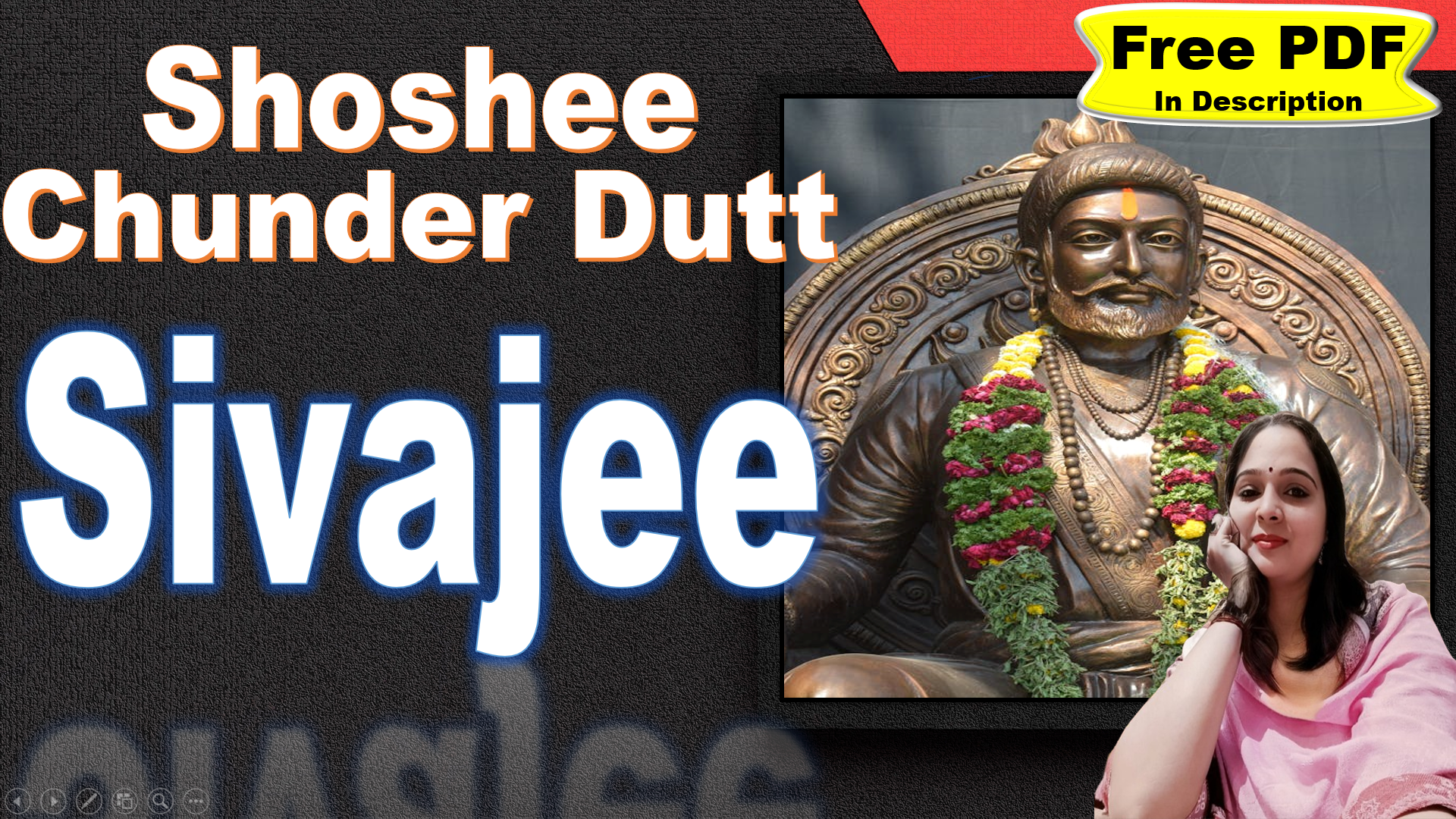Sivajee by Shoshee Chunder Dutt Summary
The poem “Sivajee” by Shoshee Chunder Dutt is a powerful narrative that captures a significant historical event in the Indian subcontinent. It portrays the encounter between the Maratha leader Sivajee and the Mughal emperor Aurangzeb, highlighting the themes of courage, defiance, betrayal, and vengeance.
The poem begins with Sivajee being led into Aurangzeb’s grand court, where the emperor sits surrounded by his nobles and slaves. Despite Sivajee’s formidable reputation, he is met with scorn and derision from the court, including Aurangzeb himself. This scorn is not just from the emperor, but also from the courtiers who once feared Sivajee’s name. The poet emphasizes the irony of the situation, where a valiant warrior is mocked by those who are essentially servile to the emperor.
Feeling insulted and disrespected, Sivajee’s anger begins to rise. His pride and honor are deeply wounded by the scorn he receives from the court. He leaves the court abruptly, without seeking the emperor’s permission, only to find himself betrayed and held captive in the land. This betrayal further fuels his anger and determination to fight back.
However, Sivajee, likened to a cunning fox and a free eagle, manages to escape from his captivity. The poet foreshadows his return, not as a humble visitor, but as a fierce warrior ready for battle. The imagery of Sivajee returning with a “sword and flame” signifies his readiness to fight and his burning desire for vengeance.
The poem then predicts that Sivajee will not return to the court to join in feasts or celebrations. Instead, he will lead the charge in battles, causing fear and devastation among his enemies. His “blood-red sword” will be seen through the smoke of war, symbolizing his relentless pursuit of victory and justice.
The poem concludes with a prophecy that Sivajee will build his name on vengeance. His deeds will echo through the land, causing even the ground to quake. Even the scornful emperor will regret having provoked his wrath. The poem ends on a note of warning, emphasizing the consequences of underestimating and disrespecting a valiant warrior like Sivajee.
Overall, the poem is a tribute to Sivajee’s courage, determination, and indomitable spirit. It criticizes the arrogance and deceit of the powerful, while celebrating the valor and resilience of those who stand up against injustice and oppression. The vivid imagery and strong emotions conveyed in the poem add depth and intensity to the narrative, making it a powerful portrayal of a significant historical event.
Key Points
Author Shoshee Chunder Dutt was an Indian writer who lived from 1824 to 1886. He was one of the pioneers of Indian writing in English and made significant contributions to Indian literature. His works often depicted Indian life and history, providing valuable insights into the culture and society of his time.
Form (Rhyme Scheme) The poem “Sivajee” is structured into ten stanzas, each containing eight lines. This form is known as an octave. The rhyme scheme of the poem is ABCBDEFE, which means that the second- and fourth-lines rhyme, and the sixth- and eighth-lines rhyme in each stanza. This consistent rhyme scheme contributes to the rhythm and musicality of the poem, enhancing its aesthetic appeal.
Speaker The speaker of the poem is an unnamed narrator who tells the story of Sivajee’s encounter with Aurangzeb. The speaker appears to be an observer of the events, providing a detailed account of the interactions between Sivajee and Aurangzeb. The speaker’s tone and choice of words suggest a sympathetic stance towards Sivajee and a critical view of Aurangzeb.
Setting The poem is set in the court of Aurangzeb, the Mughal emperor. The court is depicted as a place of power and authority, filled with knights, nobles, and slaves. The setting then shifts to the battlefield where Sivajee leads his forces against Aurangzeb. These contrasting settings highlight the conflict between the two characters and the transformation of Sivajee from a court visitor to a warrior.
Theme The main themes of the poem are honor, defiance, and revenge. The poem explores Sivajee’s refusal to be humiliated in Aurangzeb’s court, his defiance against Aurangzeb’s tyranny, and his quest for vengeance. These themes are developed through the depiction of Sivajee’s character, his interactions with Aurangzeb, and his actions on the battlefield.
Plot The poem tells the story of Sivajee’s encounter with Aurangzeb in his court, his subsequent imprisonment and escape, and his vow to seek revenge against Aurangzeb. The plot is marked by conflict, betrayal, and Sivajee’s unwavering resolve to fight for his honor. The events unfold in a dramatic manner, engaging the reader’s interest and evoking a range of emotions.
Tone The tone of the poem is serious and dramatic. The poet uses strong, emotive language to convey the intensity of Sivajee’s emotions and the seriousness of his situation. The tone enhances the dramatic effect of the poem and helps to engage the reader’s emotions.
Style The poet uses vivid imagery, metaphors, and rhetorical questions to convey the narrative. The language is formal and the descriptions are detailed, creating a vivid picture of the events. The use of these literary devices enhances the aesthetic appeal of the poem and contributes to its overall impact.
Message The message of the poem is the importance of standing up for one’s honor and the consequences of underestimating and disrespecting a proud and determined individual. The poem also highlights the destructive effects of tyranny and the power of resilience and defiance in the face of oppression. This message is conveyed through the depiction of Sivajee’s character, his actions, and the consequences of his actions. It serves as a reminder of the importance of courage, honor, and justice.
Shoshee Chunder Dutt
1. Birth and Death: Shoshee Chunder Dutt was born in 1824 and passed away in 1885. His life spanned a significant period of Indian history, including the era of British colonial rule.
2. Profession: Shoshee Chunder Dutt was a multifaceted personality. He was a Bengali author, historian, and poet. His diverse interests and talents are reflected in his wide range of works, which include historical accounts, poetry, and essays.
3. Pseudonyms: Like many authors, Shoshee Chunder Dutt also wrote under pseudonyms. He used the names J.A.G. Barton and Horatio Bickerstaffe Rowney for some of his works. This was a common practice among writers of his time, often used to explore different genres or themes.
4. Family: Shoshee Chunder Dutt was the uncle of Romesh Chunder Dutt, a renowned Indian civil servant, economic historian, and translator of Ramayana and Mahabharata. This suggests that the literary and intellectual pursuits ran in the family.
5. Works: Shoshee Chunder Dutt was a prolific writer who contributed significantly to Bengali literature. He wrote under two pseudonyms: J.A.G. Barton and Horatio Bickerstaffe Rowney. His works encompassed various genres, including history, poetry, and fiction. Some of his notable works include “The Republic of Orissá”, “The Wild Tribes of India”, and “Bengal: An Account of the Country from the Earliest Times”.
6. Contribution to Literature: Shoshee Chunder Dutt’s contribution to Indian literature is significant. As one of the first Indian authors to write in English, he played a crucial role in shaping Indian English literature. His works often reflect his deep love for his country and his desire to see it prosper. They provide valuable insights into the socio-political context of his time and continue to be relevant today.
Word Meaning
| Tough Word | Meaning in English | Meaning in Hindi |
| Stanza 1 | ||
| stately | Majestic, grand | भव्य, शानदार |
| throne | The ceremonial chair for a sovereign | सिंहासन |
| towering in the pomp of power | Displaying great power with arrogance | शक्ति के अहंकार में ऊंचा |
| tyrant | A cruel and oppressive ruler | अत्याचारी |
| knights and nobles | Medieval warriors and members of the nobility | शूरवीर और रईस |
| elate | Proud and joyful | गौरवान्वित |
| haughty | Arrogantly superior | घमंडी |
| tinsel | Showy but worthless | चमकीला लेकिन बेकार |
| Stanza 2 | ||
| knelt | To go down on one’s knees | घुटनों के बल बैठना |
| courtly smile | Polite and formal smile | दरबारी मुस्कान |
| monarch | A king or queen | सम्राट |
| scorn | Contempt | तिरस्कार |
| gazed | Looked steadily and intently | घूरना |
| minions | Followers or underlings | चापलूस |
| quail’d | Felt or showed fear | डर गया |
| valiant | Brave | वीर |
| cold respect | Unfeeling or indifferent respect | ठंडी इज्जत |
| sneer | A mocking smile, remark, or tone | उपहास |
| Stanza 3 | ||
| servile scorn | Contemptuous of someone considered inferior | गुलामी का तिरस्कार |
| vassals | Subjects or subordinates | जागीरदार |
| stubborn | Unyielding | जिद्दी |
| brow | Forehead | माथा |
| bosom | Chest | वक्षस्थल |
| plough | To make furrows in | हल चलाना |
| manly scars | Scars indicative of bravery | वीरता के निशान |
| heaved | Lifted or moved with effort | उठाना |
| warrior’s wrath | Anger of a fighter | योद्धा का क्रोध |
| Stanza 4 | ||
| shone | Emitted light | चमकना |
| shook | Trembled | कांपना |
| passions dark | Intense and sinister emotions | अंधेरे भावनाएँ |
| curb | Restrain | अंकुश |
| lofty soul | High-minded spirit | उच्च आत्मा |
| Stanza 5 | ||
| Overpower’d | Overwhelmed | अभिभूत |
| sunk | Went down or fell | डूबा |
| arose | Got up | उठ खड़ा हुआ |
| thou | You (archaic) | तू (पुराना) |
| shalt | Shall (archaic) | करेगा (पुराना) |
| rue | Regret | पछताना |
| frown | A facial expression of disapproval | भ्रूभंग |
| aloof | Distant, detached | अलग |
| sheathed | Enclosed in a protective covering | म्यान में रखा हुआ |
| avenging blade | A sword used for revenge | प्रतिशोध की तलवार |
| Stanza 6 | ||
| dudgeon | A feeling of offense or deep resentment | नाराजगी |
| high lie | Positioned prominently | ऊँचा स्थान |
| deceived | Tricked | धोखा दिया |
| betray’d | Betrayed | धोखा दिया |
| captive | Prisoner | बंदी |
| fox’s wile | Cunning trick like a fox | चालाकी |
| eagle | A large bird of prey | गरुड़ |
| shrewd | Clever, astute | चतुर |
| Stanza 7 | ||
| flown | Escaped | उड़ गया |
| wily | Sly, cunning | धूर्त |
| tame | Domesticate, control | वश में करना |
| Ye ply | You engage in (archaic) | तुम लगाओ (पुराना) |
| subtle | Delicate, understated | सूक्ष्म |
| feeble art | Weak trick | कमजोर कला |
| Stanza 8 | ||
| cringe | Bend one’s head and body in fear or in a servile manner | झुकना |
| servile knee | Showing an excessive willingness to serve or please others | दासता घुटने |
| oft | Often (archaic) | अक्सर (पुराना) |
| battle’s dusky smoke | The dark smoke of battle | युद्ध का धुंधला धुआं |
| ye’ll | You will (archaic) | तुम करोगे (पुराना) |
| merry feast | Joyful banquet | खुशियों की दावत |
| war-clouds dun | Dark clouds of war | युद्ध के काले बादल |
| slain | Killed | मारे गए |
| carnage | Large-scale killing | कत्लेआम |
| Stanza 9 | ||
| dread | Great fear | डर |
| fury | Violent anger | प्रचंड क्रोध |
| wrath | Extreme anger | क्रोध |
| woe | Great sorrow | दुख |
| avenger | One who takes revenge | प्रतिशोध लेने वाला |
| mute | Silent | मौन |
| gaze | Look steadily | घूरना |
| unrelenting | Not yielding in strength | अडिग |
| Stanza 10 | ||
| vengeance | Revenge | प्रतिशोध |
| resound | Echo loudly | गूंजना |
| Tlie | The (archaic) | वह (पुराना) |
| valiant arms | Brave actions | वीरतापूर्ण कार्य |
| quakes | Shakes | कांपना |
| e’en | Even (archaic) | यहां तक कि (पुराना) |
| scorner | One who mocks | तिरस्कार करने वाला |
| kindling | Setting alight | प्रज्वलन |
| stirr’d | Stirred (archaic) | उत्तेजित (पुराना) |
| haughty | Arrogantly superior | घमंडी |
| ire | Anger | क्रोध |










